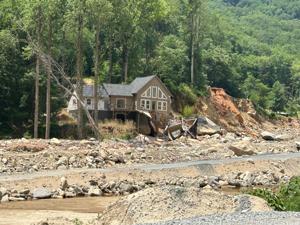Recovery from hurricanes, whether Helene in North Carolina last fall or Katrina in Louisiana two decades ago, should have survivors first, says a Tarheel State congressman.
The FEMA Act of 2025, he believes, does just that.
“This package delivers the fundamental reform that FEMA has needed for decades to function much more efficiently and effectively by putting in place clear lines of authority and real accountability to provide for a faster recovery,” said U.S. Rep. David Rouzer, R-N.C., during a hearing of the Committee on Transportation and Infrastructure in the House of Representatives. “These reforms will help keep the agency squarely focused on its core disaster mission.”
The legislation also known as House Resolution 4669 left Rouzer’s panel and next stops in the subcommittee on Economic Development, Public Buildings, and Emergency Management.
FEMA has long been an easy punching bag when disasters small and large strike. There is red tape and accountability involved, and there’s displaced Americans often hitting that tape with little more than the clothes on their backs and their world upended.
Second-term Republican President Donald Trump made western North Carolina his first trip from the White House after his inauguration. He’s spoken multiple times of changes to the Federal Emergency Management Agency, up to and including dismantling. Always, however, has been a more likely path for core functions to remain if not known as FEMA then within another agency.
The FEMA Act of 2025 would restore original status as an independent agency, removing it from the Department of Homeland Security where critics say trouble brewed under the leadership of former Homeland Security Secretary Alejandro Mayorkas in the Biden administration. Kristi Noem now leads Homeland Security for Trump, with David Richardson the senior official performing duties of FEMA administrator.
Rouzer said disaster relief should be fast, fair and focused on results. He said the bill cuts bureaucracy and speeds recovery.
The resolution, if it becomes law, would reform federal permitting and procurement and establish a Recovery Task Force with a mission to close more than 1,000 disaster declarations dating back to Hurricane Katrina in 2005.
Rouzer noted the duplicative hurdles are being softened. It would remove disincentives that have discouraged donations from charities, faith-based organizations and the public.
“The package includes several priorities of mine,” Rouzer said, “including provisions from the Duplications of Benefits Victim Relief Act. Too many families who accept a donation from a charity or take an SBA loan to keep the lights on, find out later that accepting those essential resources prevents them from receiving other assistance later for which they otherwise would be eligible. This bill makes clear that SBA loans and private charitable donations are not considered duplicative for FEMA individual assistance.”
SBA is the acronym for Small Business Administration.
Rouzer said the bill has language that breaks apart small and large disasters, so the agency can be nimble and better positioned to help.
“Florida has set the gold standard for disaster mitigation and emergency response, and this legislation builds on that success at the national level,” said Rep. Daniel Webster, R-Fla., the leader of his party on the next panel to hear the bill. “By streamlining FEMA and cutting red tape, we ensure that federal disaster response is faster, more efficient, and accountable to the American people.”






